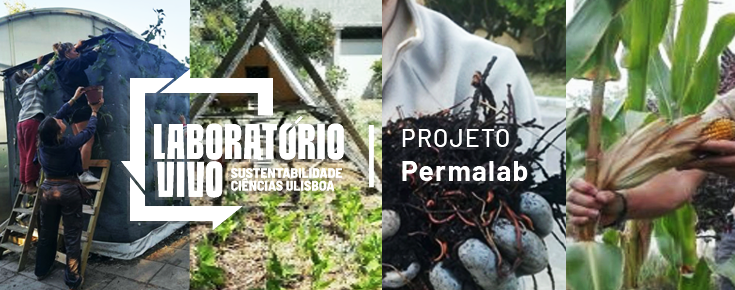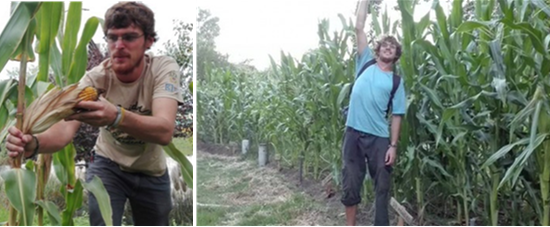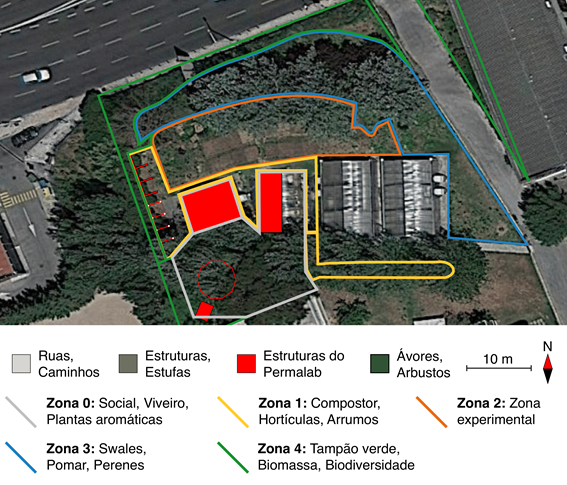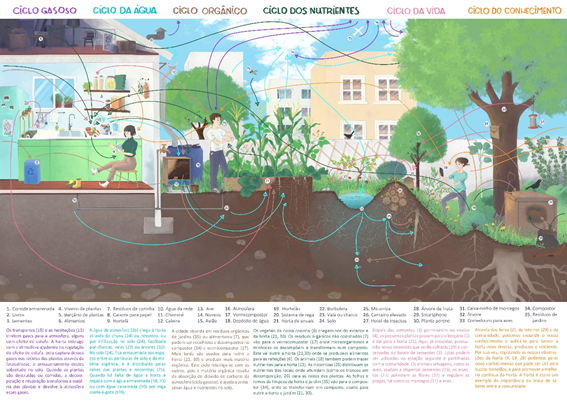

In October 2009, through a initiative of a group of science students, the HortaFCUL project was created, which would later, in collaboration with the cE3c Research Centre, initiate the Permaculture Living Laboratory. Permalab concentrates its activity in a space on campus given over to testing innovative permaculture solutions, where multiple interested parties collaborate in the development of projects, conceived and designed in a systemic way, with application in a real context, with a local identity and based on ecological principles.
PermaLab is thus an ecosystem open to innovation, centred on its users, integrating research and innovation processes proposed by permaculture in a transdisciplinary and transformative research-action environment with public-private-personal partnerships. As permaculture is a science-based planning system that mimics ecological patterns and relationships, PermaLab aims to evaluate and create scientific evidence of nature-based solutions, contributing to the regeneration of the university campus and mobilising the Science community.

- Urban Permaculture and HortaFCUL - In this video David Avelar talks about what Permaculture is in general and the urban permaculture project HortaFCUL in particular.
- Permaculture Living Lab - In this video Florian Ulm talks about what the Permaculture Living Lab (Permalab) is, how it was designed to be a research and learning space.
Permalab zones
Permalab is designed and planned from the perspective of different zones, each with specific purposes and intensity of use, and different cycles of matter and energy.

- Zone 0 - social area, nursery and aromatic plants - In this video David Avelar and Manuel Botelho talk about zone 0 of Permalab as well as its different elements - social zone, flowerbeds, greenhouses, among others.
- Zone 1 - compost area, storage and horticultural areas - In this video Florian Ulm talks about zone 1 of Permalab and how we compost organic waste.
- Zone 2 - experimental area - In this video Afonso Ferreira, António Alexandre and Tomás Simões talk about zone 2 of Permalab and its elements: the annual beds and the chicken tractor.
- Zone 3 - Aquatic biodiversity - In this video Ivo Rosa talks about zone 3 of Permalab, more specifically about the aquatic biodiversity of the ponds and its importance.
- Zone 3 - Water in Permalab - In this video Tiago Silva talks about zone 3, more specifically about its water landscape.
- Zone 4 - edible woodland area - In this video Manuel Botelho talks about zone 4 of Permalab, its swales, its functions and the biodiversity present.
Permalab cycles
Another way of looking at PermaLab is through its various cycles. The cycles have various temporal and geographical scales and are interconnected.

Illustration of the cycles of a vegetable garden for the exhibition "Hortas de Lisboa, from the Middle Ages to the 21st Century", EGEAC
Water Cycle - Water from the atmosphere reaches PermaLab through rain or fog, or by infiltration into the soil, facilitated by puddles, ditches or trees. In the soil, it is stored in the free spaces between soil particles and organic matter, and is distributed by plant roots and mycorrhizae. When there is a lack of water, the vegetable garden is watered with the water stored in containers or with piped water, in this case, through drip irrigation.
Cycle of Life - After the seeds germinate in the nursery, the small plants move on to the PermaLab gardens. Once grown, they will produce new seeds that will be harvested and stored in the seed bank. These can be used in the following season and shared with the community. Wild animals help disperse seeds, insects pollinate flowers and regulate pests, as do bats and birds.
Nutrient Cycle - The uncooked organic waste is very rich in macro and micronutrients and is therefore channelled into the PermaLab vermicompostors where micro-organisms and earthworms break it down and transform it into compost. This will nourish the garden where food is produced. Animals can also bring nutrients to the garden. Mycorrhizae installed in undisturbed soil distribute nutrients from places where they abound with compost or decaying logs to the roots of the plants.
Organic Cycle - The campus abounds in organic garden or food waste which is collected and decomposed in the compost and vermicomposting facility. They are later used to nourish the campus gardens and produce more organic matter. This cycle interconnects with the others, as organic matter results from the absorption of carbon dioxide from the atmosphere and helps store water and nutrients.
Knowledge Cycle - Through books, the internet, the community that gets involved, facilitated trainings and scientific experiments carried out in PermaLab, we share and expand our knowledge and try to apply it to make PermaLab more diverse, productive and resilient. In turn, by recording our observations, we generate new knowledge and promote the continuous improvement of the space and of other spaces and projects of the collaborative network. PermaLab aims to be a place and an example of the importance of knowledge exchange among the community.
The demonstration and innovation potential of this initiative, and the technical-scientific follow-up to it, is disseminated scientifically, as in the case of the publication of a study led by a PhD student of Science, which aimed to grow a commercial hybrid variety and an open-pollinated variety of maize, exclusively based on compost from municipal waste and green waste as nutrient sources, and subsequently to measure the yield and mineral nutrition as a contribution to sustainable urban agriculture.
Coordinators: David Avelar e Florian Ulm
Permalab links:
References about the project:
- Foodshift Pathways: More knowledge, better food choices! - Ciência Viva
- A vegetable garden in the University City? – Newspaper Desacordo
- Master Thesis: 2021, Madalena Horta, Does community scale composting produce a viable outcome? Some physical and chemical properties of green waste composts produced in the Faculty of Sciences campus
- Master Thesis: 2019, Marissa Verhoeven, From degradation to creation: closing the urban organic cycle
- PhD Thesis: 2019, Florian Ulm, Impacts of acacia longifolia invasion on soil nutrient cycles: from invasion to solution
- Master Thesis: 2016, Mariana Ramos, Contribuição para a conservação sustentável de ecossistemas dunares invadidos por Acacia longifólia.
For further information, contact sustentabilidade@ciencias.ulisboa.pt.

